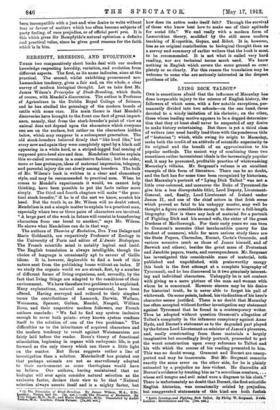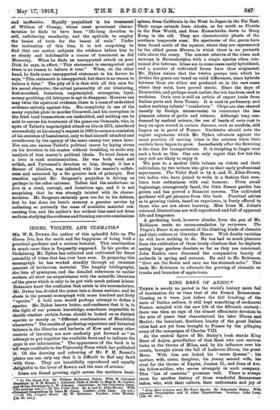LYING DICK TALBOT.*
ONE is sometimes afraid that the influence of Macaulay bee done irreparable injury to the science of English history, the followers of which seem, with a few notable exceptions, per- manently divided into two schools—on the one hand, those devoted to .a windy imitation of his rhetoric; on the other, those whose leading motive appears to be a dogged determina- tion that they at least shall never be suspected of any desire to make history entertaining. But there is yet a third class- of writers (one need hardly load-them with thaponderous title of " historian ") which, while owing its origin to Macaulay, seeks both the credit-of an attitude of scientific superiority to its original and the benefit of an approximation to his popular methods. The easiest way of combining these two sometimes rather inconsistent ideals is the increasingly popular and, it may be presumed, profitable practice of whitewashing Macaulay's villains. Mr. Sergeant's volume is an excellent example of this form of literature. There can be no doubt, and the fact has for some time been recognized by historians, that Macaulay's portrait of " Lying Dick Talbot" was not- a little over-coloured, and moreover the Duke of Tyrconnel (to give him a less disreputable title), Lord Deputy, Lieutenant- General, and, finally, Lord Lieutenant of Ireland under James II, and one of the chief actors in that Irish scene which proved so fatal to his unhappy master, may well be thought a figure considerable-enough to deserve a full-length, biography. Nor is there any lack of material for a portrait of Fighting Dick and his second wife, the sister of the great. Duchess of Marlborough. For their early years we can turn to Gramont's memoirs (that inexhaustible quarry for the student of manners), while for more serious study there are the State Papers, Clarendon, Burnet, Carte's Ormonde, and various memoirs (such as those of James himself, and of Berwick and others), besides the great mass of Protestant and Jacobite papers, tracts, and correspondence. Mr. Sergeant has investigated this considerable mass of material, both published and unpublished, with praiseworthy energy (his book is the first attempt at a complete biography of Tyrconnel), and he has discovered in it two genuinely interest- ing and individual characters. Unhappily he is not content with giving us a mere picture of the man and woman with, whom he is concerned. However sincere may be his desire- for historical truth, be is never able to forget his pail of whitewash. On some points, indeed, his vindication of his hero's
character seems justified. There is no doubt that Macaulay too often accepted without further investigation any statement against Tyrconnel that he found in a contemporary writer. Thus he adopted without question Gramont's allegation of Talbot's complicity in the infamous conspiracy against Anne Hyde, and Burnet's statement as to the degraded part played by the future Lord Lieutenant as. minister of James's pleasures, and, easily constructing from these materials a largely imaginative but exceedingly lively portrait, proceeded to put the worst construction upon every reference to Talbot and his wife which the course of his reading presented to him. This was no doubt wrong. Gramont and Burnet are unsup. ported and may be inaccurate. But Mr. Sergeant commits exactly the same error on the other side, for he is plainly animated by a prejudice no less violent. He discredits all Burnet's evidence by treating him as "a scurrilous creature, . whose evil tongue and evil mind were a disgrace to his cloth." There is unfortunately no doubt that Burnet, the first scientific English historian, was occasionally misled by prejudice, but exaggerated statenwaita of this kind are both foolish
• liittio Jennings and Fighting Hick Talbot, • By ,Philip W. Sergeant, 2440i. London ; Hutchinson and CO. [24s. 1,10.1 _ _ _ _ and ineffective. Equally prejudiced is his treatment of William of Orange, whose most prominent charac- teristics he finds to have been "life-long devotion to self, unfaltering mendacity, and the aptitude to employ the basest of tools for the basest of ends." Under the inclination of this bias, it is not surprising to find that our author subjects the evidence before hint to as steady and indefensible a course of treatment as did Macaulay. When he finds an unsupported attack on poor Dick, he says, in effect, " This statement is unsupported and there is no reason to believe it true." When, on the other hand, he finds some unsupported statement in his favour he says, " This statement is unsupported, but there is no reason to believe it false." The pity of it is that with all this care for his moral character, the actual personality of our blustering, foul-mouthed, luxurious, unprincipled, courageous, loyal, money-grubbing old intriguer is apt to disappear. However one may twist the equivocal evidence, there is a mass of undoubted evidence entirely against him. His complicity in one of the ;many royalist plots to murder Cromwell, and his corruption in the Irish land transactions are undoubted, and nothing can be said to excuse his treatment of the generous Ormonde, who, in spite of Talbot's unprincipled attack on him in 1671, interfered successfully at his enemy's request in 1682 to secure a remission of his sentence of banishment, only to find himself attacked and overthrown by the agency of the same enemy two years later. Nor can one excuse Talbot's political career by laying stress on his devotion to his master without troubling to make any analysis of that master's political ideals. To treat James as a hero is rank sentimentalism. He was both weak and selfish, and Tyrconnel's devotion to him, though it has a flavour of idealism, was infected with the master's selfish- zit:se and animated by a far greater lack of principle. But reaction against Mr. Sergeant's prejudice is driving us perhaps to the other extreme. Talbot had the misfortune to hive in a cruel, corrupt, and licentious age, and it is not surprising that he was strongly tainted with its charac- teristics. Mr. Sergeant certainly goes too far in his defence, but he has done his hero's memory a genuine service by collecting so patiently the mass of available material con- cerning him, and the author's too evident bias need not deter us from studying the evidence and forming our own conclusions.











































 Previous page
Previous page